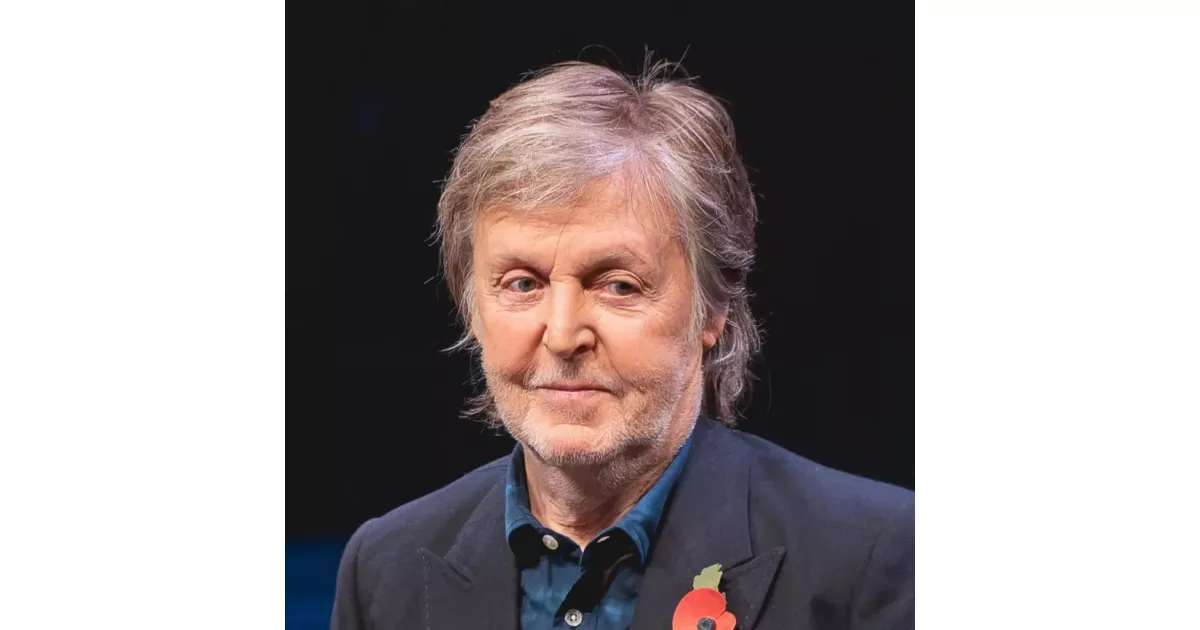Sir Paul McCartney is an English singer, songwriter, and musician, most notably known for his role in The Beatles. Playing bass guitar and piano, he shared primary songwriting and lead vocal duties with John Lennon. McCartney is celebrated as one of history's most successful composers and performers, marked by his melodic bass lines, wide vocal range, and genre-spanning musical exploration from pop and classical to electronica. His songwriting partnership with Lennon is recognized as the most successful in music history.
1902: Jim McCartney's Birth Year
Jim McCartney, Paul McCartney's father, was born in 1902.
1909: Mary Patricia Mohin's Birth Year
Mary Patricia (née Mohin), Paul McCartney's mother, was born in 1909.
June 1942: Birth of James Paul McCartney
In June 1942, James Paul McCartney was born at Walton Hospital in Liverpool to parents Mary Patricia (née Mohin) and Jim McCartney. He was raised in a household with Irish descent, along with his younger brother Peter Michael.
1944: Family Rehoused in Knowsley
In 1944, the McCartney family was rehoused at a flat in Knowsley.
1946: Family Moves to Speke
In 1946, the McCartney family moved to a council housing development in Speke.
1947: Attends Stockton Wood Road Primary School
From 1947, Paul McCartney attended Stockton Wood Road Primary School in Speke.
1949: Transfers to Joseph Williams Junior School
In 1949, Paul McCartney transferred to Joseph Williams Junior School in Belle Vale due to overcrowding at Stockton Wood Road Primary School.
1953: Passes the 11-Plus Exam
In 1953, Paul McCartney passed the 11-Plus exam, allowing him to attend the Liverpool Institute, a grammar school.
1954: Meets George Harrison
In 1954, Paul McCartney met schoolmate George Harrison on the bus from his home in Speke, marking the beginning of their friendship.
October 1956: Death of Mary McCartney
On October 31, 1956, Paul McCartney's mother, Mary McCartney, died of an embolism as a complication of surgery for breast cancer, marking a significant loss in his life at the age of 14.
1956: Death of Paul McCartney's Mother
In 1956, Mary Patricia (née Mohin), Paul McCartney's mother, died.
July 1957: Meets John Lennon
On July 6, 1957, at the age of fifteen, Paul McCartney met John Lennon and his band, the Quarrymen, at the St Peter's Church Hall fête in Woolton, leading to his invitation to join the band as a rhythm guitarist.
1957: Joins the Quarrymen
In 1957, Paul McCartney began his musical career by joining John Lennon's skiffle group, the Quarrymen.
1958: John Lennon's mother dies
In 1958, John Lennon's mother, Julia, died when Lennon was 17. This shared experience of loss created a connection between Lennon and McCartney.
1959: Met Dorothy "Dot" Rhone
In 1959, Paul McCartney met Dorothy "Dot" Rhone, his first serious girlfriend in Liverpool, at the Casbah club.
May 1960: Band Name Changes
By May 1960, the band had tried several names, including Johnny and the Moondogs, Beatals and the Silver Beetles.
August 1960: The Beatles Name Adoption
In August 1960, the band adopted the name the Beatles and recruited drummer Pete Best before a residency in Hamburg.
1960: The Beatles Form
In 1960, the Quarrymen evolved into the Beatles, marking a significant moment in music history.
1961: McCartney Becomes Bass Player
In 1961, after Stuart Sutcliffe left the band, Paul McCartney became the Beatles' bass player.
January 1962: Brian Epstein Becomes Manager
In January 1962, Brian Epstein became the Beatles' manager, a pivotal moment in their development and success.
June 1962: Signed First Recording Contract with Parlophone
In June 1962, Paul McCartney, as a member of the Beatles, signed his first recording contract with Parlophone Records, an EMI subsidiary.
1962: McCartney's successful song writing
Between 1962 and 1978, Paul McCartney wrote jointly or solo 43 songs which sold one million or more records
1962: Rhone Visited Hamburg
In 1962, Dorothy Rhone accompanied Cynthia Lennon to Hamburg when The Beatles played there again.
April 1963: First Meeting with Jane Asher
In April 1963, Paul McCartney first met British actress Jane Asher at a Beatles performance at the Royal Albert Hall in London.
1963: Northern Songs Established
In 1963, Dick James established Northern Songs to publish the songs of Lennon–McCartney.
1963: Popularity in the UK
In 1963, The Beatles became popular in the UK.
1964: Introduction to Cannabis
In 1964, Bob Dylan introduced The Beatles to cannabis in a New York hotel room, which McCartney recalls led to him getting "very high".
1964: Bought Epiphone Casino Guitar
In 1964, Paul McCartney bought an Epiphone Casino guitar, because its hollow body would produce more feedback.
1964: Popularity in the US
In 1964, The Beatles became popular in the US.
1964: Moves from Forthlin Road
In 1964, The McCartney family moved from 20 Forthlin Road in Allerton, where they had lived since moving there thanks to Mary McCartney's midwifery earnings.
August 1965: Release of "Yesterday"
In August 1965, The Beatles released "Yesterday", a McCartney composition featuring a string quartet, marking their first recorded use of classical music elements and becoming one of the most covered songs in popular music history.
1965: Favored Rickenbacker 4001S for Recordings
From 1965, Paul McCartney favored his Rickenbacker 4001S for recording, though he primarily used a Höfner 500/1 bass during his early years with The Beatles.
1965: Northern Songs Public Stock Offering
In 1965, Northern Songs had a public stock offering, after which Paul McCartney initially owned 20% of Northern Songs, which became 15%.
1965: Member of the Order of the British Empire
In 1965, Paul McCartney was appointed as a Member of the Order of the British Empire (MBE).
March 1966: Moved to Own Home in St John's Wood
In March 1966, Paul McCartney moved to his own home in St John's Wood after living with Jane Asher at her parents' home for over two years.
June 1966: Promotional Films Aired
In June 1966, promotional films for "Paperback Writer" and its B-side, "Rain", aired on The Ed Sullivan Show and Top of the Pops.
November 1966: Experimental Recording Sessions Begin
In November 1966, The Beatles began adopting an experimental attitude during recording sessions for the album.
1966: First Met Linda Eastman
In 1966, Linda Eastman first met The Beatles at Shea Stadium. She later commented that she was initially interested in John Lennon, but her fascination faded and she liked Paul.
1966: First Independent Musical Project
In 1966, Paul McCartney completed his first musical project independent of The Beatles: a film score for the UK production "The Family Way".
1966: Rumored death
In October 1969, rumors surfaced that McCartney had died in a car crash in 1966.
1966: First LSD Experience
In late 1966, Paul McCartney eventually tried LSD for the first time.
February 1967: Release of Double A-Side Single
In February 1967, The Beatles released the double A-side single "Strawberry Fields Forever"/"Penny Lane".
March 1967: Second LSD Experience
In March 1967, Paul McCartney took his second "acid trip" with John Lennon after a Sgt. Pepper studio session.
May 1967: Proper Acquaintance with Linda Eastman
On 15 May 1967, Paul McCartney and Linda Eastman became properly acquainted at a Georgie Fame concert at The Bag O'Nails club during her UK assignment to photograph rock musicians in London.
August 1967: Death of Brian Epstein
In August 1967, Brian Epstein's death created a void, leading Paul McCartney to step in as the de facto leader and business manager of The Beatles.
1967: Started Using Fender Bassman for Amplification
By 1967, while typically using Vox amplifiers, Paul McCartney had also begun using a Fender Bassman for amplification.
1967: Beatles Re-signed with EMI
In 1967, The Beatles re-signed with EMI for another nine years.
1967: Sgt. Pepper's Lonely Hearts Club Band Album
Starting with the album "Sgt. Pepper's Lonely Hearts Club Band" in 1967, McCartney began to take on a leadership role within the Beatles, driving the creative direction of their music and film projects.
1968: Deteriorating Relations Within the Band
By late 1968, relations within The Beatles were deteriorating, particularly during the recording of their eponymous double album, also known as the "White Album".
1968: Argument during the recording session for The Beatles
During a recording session for The Beatles in 1968, Paul McCartney's critique of Ringo Starr's drum part for "Back in the U.S.S.R." led to an argument that resulted in Starr temporarily leaving the band.
1968: Played Drums on "And the Sun Will Shine"
In 1968, Paul McCartney played the drums on Paul Jones' rendition of "And the Sun Will Shine".
1968: "Hey Jude" tops UK and US charts
In 1968, The Beatles composition "Hey Jude", co-written by Paul McCartney, achieved the highest sales in the UK that year and topped the US charts for nine weeks. It achieved sales of over five million copies soon after its release.
1968: Apple Records Formed
In 1968, after forming their own record label, Apple Records, the Beatles' recordings would be released through Apple although the masters were still owned by EMI.
March 1969: Paul McCartney marries Linda Eastman
In March 1969, Paul McCartney married Linda Eastman. Despite a pre-wedding argument that almost led to the cancellation of the ceremony, they proceeded and established a close and loving relationship.
March 1969: Marriage to Linda Eastman
In March 1969, Paul McCartney married his first wife, Linda Eastman.
September 1969: John Lennon Privately Leaves The Beatles
In September 1969, John Lennon privately left the Beatles but agreed to keep it secret to avoid jeopardizing ongoing business negotiations.
October 1969: Rumor of Death
In October 1969, a rumour surfaced that Paul McCartney had died in a car crash in 1966 and was replaced by a lookalike, but this was quickly refuted.
1969: Sale of Controlling Interest in Northern Songs
In 1969, Dick James sold a controlling interest in Northern Songs to Lew Grade's Associated Television (ATV) after which Paul McCartney and John Lennon sold their remaining shares.
1969: Played Drums on Steve Miller Band Tracks
In 1969, Paul McCartney played drums on the Steve Miller Band's tracks "Celebration Song" and "My Dark Hour".
April 1970: McCartney Announces Departure from the Beatles
On April 10, 1970, amidst business disagreements with his bandmates, largely concerning Allen Klein's management, Paul McCartney announced his departure from the Beatles.
December 1970: McCartney Files Suit for Beatles' Dissolution
On December 31, 1970, McCartney filed a lawsuit for the formal dissolution of The Beatles, marking a significant step in the band's separation.
1970: McCartney Releases His First Solo Album
In 1970, Paul McCartney released his first solo album, "McCartney", which reached number one in the US charts. This marked the beginning of his post-Beatles musical career.
1970: Solo Debut and Formation of Wings
In 1970, after the Beatles disbanded, Paul McCartney launched his solo career with the album "McCartney" and formed the band Wings with his wife Linda and Denny Laine.
March 1971: Court Appoints Receiver for Apple Corps
In March 1971, the court appointed a receiver to oversee the finances of the Beatles' company, Apple Corps, signaling further complications in the band's affairs.
September 1971: Stella McCartney's Birth
In September 1971, Paul and Linda McCartney's daughter, Stella, was born, named in honour of Linda's grandmothers, both named Stella.
1971: Bought Buddy Holly's Publishing Rights
In 1971, Paul McCartney bought the publishing rights to Buddy Holly's music catalog.
1971: Formation of Wings
In 1971, following the Beatles' break-up, Paul McCartney and his wife Linda formed the band Wings. Despite facing criticism regarding Linda's musical abilities, Paul defended her contributions, noting her skill with the Minimoog synthesizer.
1972: Re-signed with ATV
In 1972, Paul McCartney re-signed with ATV for seven years in a joint publishing agreement between ATV and McCartney Music.
1972: Fine for Cannabis Possession in Sweden
In 1972, Paul McCartney was fined £1,000 by a Swedish court for cannabis possession.
1972: Stolen Höfner 500/1 bass
In 1972, Paul McCartney's original Höfner 500/1 bass was stolen.
1972: Wings' First Concert Tour Begins
In 1972, Wings began their first concert tour, debuting at the University of Nottingham in front of an audience of 700. They toured UK universities, staying in modest accommodations and avoiding Beatles songs.
March 1973: Wings Achieves First US Number One Single
In March 1973, Wings achieved their first US number-one single, "My Love", which was included on their second LP, Red Rose Speedway, which also topped the US charts and reached the UK top five.
December 1973: US Visa Denial
Until December 1973, the US government repeatedly denied Paul McCartney a visa due to his drug convictions.
1973: McCartney contributes to Starr's album Ringo
In 1973, Paul McCartney contributed instrumentation and backing vocals for "Six O'Clock", a song he wrote for Ringo Starr's album Ringo. McCartney also played a kazoo solo on "You're Sixteen" from the same album.
1973: Conviction for Illegal Cultivation in Scotland
In 1973, Paul McCartney was convicted of illegal cultivation of marijuana and fined £100 at Campbeltown Sheriff Court after Scottish police found marijuana plants growing on his farm.
1973: Voted Best Rock Bassist by Creem
In 1973, Paul McCartney was voted the best rock bassist in Creem's Reader Poll Results.
1973: Wings Releases Band on the Run
In 1973, after McCullough and Seiwell's departure, Wings recorded "Band on the Run". The album became a US and UK number one and remained on the UK charts for 124 weeks.
1974: Voted Best Rock Bassist by Creem
In 1974, Paul McCartney was voted the best rock bassist in Creem's Reader Poll Results for the second consecutive year.
1974: Wings Achieves Second US Number-One Single
In 1974, Wings achieved a second US number-one single with the title track from their album "Band on the Run". Also in 1974, McCartney hired guitarist Jimmy McCulloch and drummer Geoff Britton.
1974: McCartney and Lennon Briefly Reconnect
In early 1974, Paul McCartney and John Lennon briefly became close again after having a strained relationship post-Beatles, even playing music together on one occasion. However, the two grew apart in later years.
January 1975: English Court Dissolves Beatles' Partnership
On January 9, 1975, an English court legally dissolved the Beatles' partnership, officially ending the band's formal association.
1975: Wings Wins Grammy Award
In 1975, Paul McCartney and Wings won the Grammy Award for Best Pop Vocal Performance for the song "Band on the Run", and Geoff Emerick won the Grammy for Best Engineered Recording for the album. Also in 1975, Geoff Britton quit during recording sessions and was replaced by Joe English.
1975: Marijuana Possession Arrest in Los Angeles
In 1975, Paul McCartney was arrested again for marijuana possession in Los Angeles. Linda took the blame, and the court dismissed the charges.
1975: Voted Third Best Rock Bassist by Creem
In 1975, Paul McCartney was voted the third best rock bassist in Creem's Reader Poll Results.
1975: Wings Release Venus and Mars and Begin World Tour
In 1975, Wings released the chart-topping album "Venus and Mars" and began the Wings Over the World Tour, which lasted fourteen months with stops in the UK, Australia, Europe, and the US.
1975: Became a Vegetarian
Since 1975, Paul McCartney has been a vegetarian.
April 1976: McCartney and Lennon Consider SNL Reunion Offer
On 24 April 1976, Paul McCartney and John Lennon considered a $3,000 offer to reunite the Beatles on Saturday Night Live while watching the show at Lennon's home in the Dakota. Although tempted, they decided it was too late to go to the studio, making it their last time together.
1976: End of Beatles' Recording Contract
Following the break-up of the Beatles, Paul McCartney's music continued to be released by Apple Records under the Beatles' 1967 recording contract with EMI which ran until 1976.
1976: Wings Release Wings at the Speed of Sound
In 1976, Wings released the chart-topping album "Wings at the Speed of Sound", continuing their run of successful releases.
1976: Inaugurated Buddy Holly Week
In 1976, on what would have been Buddy Holly's fortieth birthday, Paul McCartney started the annual "Buddy Holly Week" in England to celebrate Holly's legacy.
1976: Death of Paul McCartney's Father
Jim McCartney, Paul McCartney's father, died in 1976.
September 1977: Birth of James McCartney
In September 1977, Paul and Linda McCartney welcomed their third child, a son named James.
1977: Voted Third Best Rock Bassist by Creem
In 1977, Paul McCartney was voted the third best rock bassist in Creem's Reader Poll Results.
1978: McCartney's successful song writing
Between 1962 and 1978, Paul McCartney wrote jointly or solo 43 songs which sold one million or more records
1978: McCartney Acquired Beatles' Songs Publishing Rights
In 1978, Paul McCartney acquired the publishing rights to two of The Beatles' earliest songs, "Love Me Do" and "P.S. I Love You", from Ardmore & Beechwood.
1978: Wings Release London Town
In 1978, Wings released "London Town", which spawned the US number-one single "With a Little Luck" and achieved top-five status in both the US and the UK.
1979: Signed with Columbia Records
In 1979, Paul McCartney signed with Columbia Records in the US and Canada, reportedly receiving the industry's most lucrative recording contract to date, while remaining with EMI for distribution throughout the rest of the world.
1979: Wings Last Number One Hit
In 1979, Wings last number one hit was the live version of "Coming Up", which was recorded in Glasgow, Scotland.
1979: Wings Release Back to the Egg
In 1979, Wings released "Back to the Egg", which featured a rock supergroup called "Rockestra" and included 20 shows in the UK, debuting Beatles songs like "Got to Get You into My Life", "The Fool on the Hill" and "Let It Be".
1979: Guinness Book recognizes McCartney
In 1979, the Guinness Book of World Records recognized Paul McCartney as the "most honored composer and performer in music", with 60 gold discs and significant sales as a member of the Beatles.
1979: MPL Communications Published McCartney's Songs
Since 1979, MPL Communications has published Paul McCartney's songs.
January 1980: Arrest and Deportation in Japan
In January 1980, Paul McCartney was arrested in Japan after customs officials found approximately 8 ounces of cannabis in his luggage. He was later released and deported without charge after ten days.
December 1980: McCartney's reaction to Lennon's Murder
On 9 December 1980, Paul McCartney responded to the news of John Lennon's murder the previous night. McCartney's initial reaction of "It's a drag" was met with criticism, though he later clarified that he deeply felt the loss.
1980: McCartney Releases McCartney II
In 1980, Paul McCartney released his second solo LP, "McCartney II", which he self-produced. The album peaked at number one in the UK and number three in the US.
1980: Resumes Solo Career
In 1980, Paul McCartney resumed his solo career after the dissolution of Wings.
April 1981: Wings Discontinues After Laine Quits
In April 1981, Paul McCartney discontinued Wings after Denny Laine quit due to disagreements over royalties and salaries, marking the end of the band.
1981: Failed Purchase of Northern Songs Catalogue
In 1981, Paul McCartney and Yoko Ono attempted to purchase the Northern Songs catalogue, but their offer was declined.
1981: McCartney sings backup on Harrison's tribute to Lennon
In 1981, Paul McCartney sang backup on George Harrison's tribute to John Lennon, "All Those Years Ago", which also featured Ringo Starr on drums.
1981: Wrote and Produced "Rupert and the Frog Song"
In 1981, Paul McCartney wrote, produced, and contributed character voices for a short animated film directed by Geoff Dunbar called Rupert and the Frog Song. His song "We All Stand Together" from the film's soundtrack reached No. 3 in the UK Singles Chart.
1982: Collaborations with Stevie Wonder and Michael Jackson
In 1982, McCartney collaborated with Stevie Wonder on "Ebony and Ivory" and with Michael Jackson on "The Girl Is Mine", marking significant collaborations in his solo career.
1982: McCartney releases 'Here Today'
In 1982, Paul McCartney released "Here Today", a song described as a tribute to his friendship with John Lennon.
1983: Took Up Painting
In 1983, Paul McCartney became interested in painting after watching artist Willem de Kooning work in his Long Island studio and started painting himself.
1983: McCartney reflects on his relationship with Lennon
In 1983, Paul McCartney reflected on his relationship with John Lennon, expressing regret for not making more effort to connect with him and acknowledging the deep sadness he felt after Lennon's death.
1984: McCartney Stars in Give My Regards to Broad Street
In 1984, McCartney starred in "Give My Regards to Broad Street", a film he also wrote and produced. Although the film received poor reviews, the soundtrack reached number one in the UK.
1984: Arrested for Marijuana Possession in Barbados
In 1984, Paul McCartney was arrested for possession of marijuana while on holiday in Barbados and fined $200.
1984: Starr appears in McCartney's film Give My Regards to Broad Street
In 1984, Ringo Starr appeared as a fictional version of himself in Paul McCartney's film Give My Regards to Broad Street and played drums on most tracks of the soundtrack album.
1984: "Mull of Kintyre" UK Sales Record Broken
Until the 1984 release of "Do They Know It's Christmas?", the Wings song "Mull of Kintyre" held the UK sales record with 2.5 million copies sold.
1985: McCartney Participates in Live Aid
In 1985, McCartney participated in Live Aid and performed "Let it Be", with technical difficulties initially affecting the audio quality.
1985: Michael Jackson Acquires ATV Music
In 1985, Michael Jackson purchased ATV Music, the parent company of Northern Songs, leading to criticism from McCartney.
1985: Produced "The Real Buddy Holly Story"
In 1985, Paul McCartney produced and hosted The Real Buddy Holly Story, a documentary featuring interviews with Keith Richards, Phil and Don Everly, the Holly family, and others.
1985: Returned to Capitol in the US
In 1985, Paul McCartney returned to Capitol Records in the US, remaining with EMI until 2006.
1986: McCartney Collaborates with Eric Stewart on Press to Play
In 1986, Paul McCartney collaborated with Eric Stewart on "Press to Play", with Stewart co-writing more than half of the album's songs.
1988: Release of Снова в СССР
In 1988, Paul McCartney released Снова в СССР, which was initially available only in the Soviet Union and contained eighteen cover songs recorded over two days.
1988: Induction into the Rock and Roll Hall of Fame
In 1988, Paul McCartney was inducted into the Rock and Roll Hall of Fame as a member of The Beatles.
1988: McCartney inducted into Rock and Roll Hall of Fame
In 1988, Paul McCartney was inducted into the Rock and Roll Hall of Fame as a member of the Beatles.
September 1989: Launch of the Paul McCartney World Tour
In September 1989, Paul McCartney launched the Paul McCartney World Tour, his first tour in over a decade. That same year, he released Flowers in the Dirt; a collaborative effort with Elvis Costello.
1989: Solo Touring
In 1989, Paul McCartney began touring as a solo artist.
1989: Recording of "Ferry Cross the Mersey"
In 1989, Paul McCartney participated in the charity recording of "Ferry Cross the Mersey".
1989: UK's Wealthiest Musician
Since the Rich List began in 1989, Paul McCartney has been the UK's wealthiest musician.
1989: Lawsuits Against EMI and Others Persist
Until 1989, sporadic lawsuits against EMI, Allen Klein, and the former Beatles members persisted, extending the legal entanglements following the band's dissolution.
April 1990: Largest Paying Stadium Audience
On April 21, 1990, Paul McCartney performed for the largest paying stadium audience in history, with 184,000 people attending his concert at Maracanã Stadium in Rio de Janeiro, Brazil.
1990: Changed back to the Höfner Bass
Around 1990, Paul McCartney switched back to using the Höfner bass because it inspired him to play more sensitively, something he considers fundamental to his playing style.
1990: Named Favorite Guitar Players
In 1990, when asked who his favorite guitar players were, Paul McCartney included Eddie Van Halen, Eric Clapton, and David Gilmour, stating, "but I still like Hendrix the best".
1991: Liverpool Oratorio Premiere and MTV Unplugged
In 1991, Paul McCartney premiered his orchestral piece "Liverpool Oratorio" and performed on MTV Unplugged, later releasing a live album of the performance titled "Unplugged (The Official Bootleg)".
1992: Won BAFTA Award with Geoff Dunbar
In 1992, Paul McCartney worked with Geoff Dunbar on an animated film about the work of French artist Honoré Daumier, which won them a BAFTA award.
1993: Collaboration with Youth and New World Tour
In 1993, McCartney collaborated with Youth of Killing Joke as "the Fireman", releasing the album "Strawberries Oceans Ships Forest", and released the rock album "Off the Ground", followed by the New World Tour and the "Paul Is Live" album.
1995: Northern Songs Dissolved and Merged with Sony/ATV
In 1995, Northern Songs was formally dissolved and absorbed into the Sony/ATV catalogue after Jackson merged his catalogue with Sony. McCartney receives royalties from commercial proceeds.
1995: Guest Appearance on The Simpsons and Directed Documentary
In 1995, Paul McCartney made a guest appearance on The Simpsons episode "Lisa the Vegetarian" and directed a short documentary about the Grateful Dead.
1995: Narrated 'Devour the Earth' Documentary
In 1995, Paul McCartney narrated the documentary 'Devour the Earth', written by Tony Wardle.
1995: Honorary Fellowship of the Royal College of Music
In 1995, Prince Charles presented Paul McCartney with an Honorary Fellowship of the Royal College of Music.
1997: Official Biography Released
In 1997, Barry Miles wrote Paul McCartney's official biography, Many Years from Now.
1997: McCartney reflects on Lennon's death
In 1997, Paul McCartney said that John Lennon's death made the remaining ex-Beatles nervous that they might also be murdered.
1997: Support for Decriminalization of Cannabis
In 1997, Paul McCartney spoke out in support of decriminalization of cannabis, arguing that making people criminals for smoking pot was wrong.
1997: Knight Bachelor
In 1997, Paul McCartney was appointed as Knight Bachelor for services to music.
1997: Starr plays on McCartney's album Flaming Pie
In 1997, Ringo Starr played drums and sang backing vocals on "Beautiful Night" from Paul McCartney's album Flaming Pie.
1998: Linda McCartney's Death
In 1998, Linda McCartney passed away at the age of 56 after battling breast cancer. Paul sought counseling to cope with the loss and alleviate feelings of guilt, reflecting on the simplicity and beauty of their marriage.
1998: McCartney collaborates on Starr's Vertical Man
In 1998, Paul McCartney collaborated on Ringo Starr's Vertical Man, providing backing vocals on three songs and instrumentation on one.
1999: First Art Exhibition in Siegen, Germany
In 1999, Paul McCartney first exhibited his paintings in Siegen, Germany. The 70-painting show featured portraits of John Lennon, Andy Warhol, and David Bowie.
1999: Investment in Linda McCartney Foods
In 1999, Paul McCartney spent £3,000,000 to ensure Linda McCartney Foods remained free of genetically engineered ingredients.
1999: McCartney inducted into Rock and Roll Hall of Fame as solo artist
In 1999, Paul McCartney was inducted into the Rock and Roll Hall of Fame as a solo artist.
1999: Rock and Roll Hall of Fame (Solo)
In 1999, Paul McCartney was inducted into the Rock and Roll Hall of Fame as a solo artist.
September 2000: First UK Exhibition of Paintings
In September 2000, Paul McCartney's first UK exhibition of paintings opened, featuring 500 canvases at the Arnolfini Gallery in Bristol, England.
October 2000: Art Debuted in Liverpool
In October 2000, Paul McCartney's art debuted in his hometown of Liverpool at the Walker Art Gallery.
2000: "Two of Us" fictionalizes McCartney and Lennon event
In 2000, VH1 fictionalized the April 24, 1976 event when McCartney and Lennon considered an SNL reunion offer, in the television film "Two of Us."
November 2001: McCartney's reaction to Harrison's Death
In November 2001, following George Harrison's death, Paul McCartney expressed his affection and admiration for Harrison, reminiscing about their shared history and close bond.
2001: Published "Blackbird Singing"
In 2001, Paul McCartney published "Blackbird Singing", a volume of poems and lyrics to his songs.
2002: Paul McCartney marries Heather Mills
In 2002, Paul McCartney married Heather Mills, a former model and anti-landmine campaigner.
2002: McCartney calls Lennon his greatest hero
In 2002, Paul McCartney told Mojo magazine that John Lennon was his greatest hero.
2003: Birth of Beatrice Milly McCartney
In 2003, Paul McCartney and Heather Mills had a child named Beatrice Milly, honoring Mills's late mother and one of McCartney's aunts.
2003: Meeting with Vladimir Putin on Landmines
In 2003, Paul McCartney and Heather Mills met with Vladimir Putin at the Kremlin, urging Russia to join the anti-landmine campaign.
2003: Highest Income Within Media Professions in the UK
In 2003, Paul McCartney earned £40 million, making him the highest income earner that year within media professions in the UK.
2004: Worked on "Tropic Island Hum" Animated Short
In 2004, Paul McCartney and Geoff Dunbar worked together on the animated short film Tropic Island Hum. The accompanying single, "Tropic Island Hum"/"We All Stand Together", reached number 21 in the UK.
2004: McCartney comments on Media Animosity
In 2004, Paul McCartney commented on the negative media attention directed toward his partners, referencing past disapproval regarding his relationships with Jane Asher and Linda Eastman.
2004: Donation to US Campaign for Burma
In 2004, Paul McCartney donated a song to an album to aid the "US Campaign for Burma", in support of Aung San Suu Kyi.
July 2005: Release of "Sgt. Pepper's Lonely Hearts Club Band" performance at Live 8
In July 2005, Paul McCartney's performance of "Sgt. Pepper's Lonely Hearts Club Band" with U2 at Live 8 became the fastest-released single in history, reaching number one on the UK Official Download Chart within forty-five minutes of its recording.
2005: Income Rose
By 2005, Paul McCartney's income rose to £48.5 million.
2005: Published "High in the Clouds"
In 2005, Paul McCartney's first children's book, "High in the Clouds: An Urban Furry Tail", a collaboration with writer Philip Ardagh and animator Geoff Dunbar, was published by Faber & Faber.
April 2006: McCartney and Mills Separate
In April 2006, Paul McCartney and Heather Mills separated, marking the beginning of the end of their marriage.
2006: Campaign Against Seal Hunting
In 2006, Paul and Heather McCartney traveled to Prince Edward Island to raise international awareness of seal hunting and debated with Newfoundland's Premier Danny Williams on Larry King Live.
2006: Ended Contract with EMI
Paul McCartney's contract with EMI ended in 2006.
November 2007: McCartney and Shevell's Relationship Begins
In November 2007, Paul McCartney began a relationship with Nancy Shevell, whom he had known for about 20 years prior.
2007: Signed with Hear Music
In 2007, Paul McCartney signed with Hear Music, becoming the label's first artist.
May 2008: McCartney and Mills Divorce
In May 2008, Paul McCartney and Heather Mills divorced after separating in April 2006. The divorce proceedings were acrimonious.
2008: Donation to Aid Still Required
In 2008, Paul McCartney donated a song to Aid Still Required's CD, which was organized as an effort to raise funds to assist with the recovery from the devastation caused in Southeast Asia by the 2004 tsunami.
2008: Publicly States Support for Both Everton F.C. and Liverpool F.C.
In 2008, Paul McCartney publicly stated his support for both Everton F.C. and Liverpool F.C., clarifying that while his family are Evertonians, he supports both teams.
2009: Record Sales and Songwriting Achievements
As of 2009, Paul McCartney had written or co-written a record 32 songs that topped the Billboard Hot 100 and had sales of 25.5 million RIAA-certified units in the US.
2009: McCartney's record sales
As of 2009, Paul McCartney has 15.5 million RIAA-certified units in the United States as a solo artist, and an additional 10 million with Wings.
2009: Guinness World Records recognizes McCartney
In 2009, Guinness World Records recognized Paul McCartney as the "most successful songwriter" for having written or co-written 188 charted records in the United Kingdom.
2009: McCartney and Starr perform for David Lynch Foundation
In 2009, Paul McCartney and Ringo Starr performed "With a Little Help from My Friends" at a benefit concert for the David Lynch Foundation.
2009: Narrated "Glass Walls" Video for PETA
In 2009, Paul McCartney narrated a video for PETA titled "Glass Walls", which was critical of slaughterhouses and the meat industry.
2009: Letter to the Dalai Lama
In 2009, Paul McCartney wrote to the 14th Dalai Lama questioning his meat consumption.
July 2010: McCartney joins Starr's birthday concert
On 7 July 2010, Paul McCartney made a surprise appearance at Ringo Starr's seventieth birthday concert at Radio City Music Hall in New York, performing the Beatles' song "Birthday" with Starr's band.
2010: McCartney collaborates on Starr's album Y Not
In 2010, Paul McCartney collaborated on Ringo Starr's album Y Not, playing bass on "Peace Dream" and singing a duet with Starr on "Walk with You".
October 2011: Paul McCartney marries Nancy Shevell
On 9 October 2011, Paul McCartney married Nancy Shevell in a civil ceremony at Marylebone Town Hall, London. The wedding was a modest event attended by about 30 relatives and friends.
2011: Voted Third Best Bassist of All Time by Rolling Stone
In 2011, a Rolling Stone readers' poll voted Paul McCartney the third best bassist of all time.
2012: Joined Artists Against Fracking
In 2012, Paul McCartney joined the anti-fracking campaign Artists Against Fracking.
2012: "On the Run Tour" Grossed £37 Million
Paul McCartney's 18-date "On the Run Tour" grossed £37 million in 2012.
January 2014: McCartney and Starr perform at the Grammy Awards
On 26 January 2014, Paul McCartney and Ringo Starr performed "Queenie Eye" from McCartney's album New at the 56th Annual Grammy Awards.
2014: Most Recent UK Number One
As of 2014, McCartney's most recent UK number one was the title track of his LP "Pipes of Peace", showcasing his enduring success.
April 2015: McCartney inducts Starr into the Rock and Roll Hall of Fame
In April 2015, Paul McCartney inducted Ringo Starr into the Rock and Roll Hall of Fame.
2015: Estimated Fortune in 2015
In 2015, Paul McCartney had an estimated fortune of £730 million.
2015: Opposition to Fox Hunting Reintroduction
In 2015, Paul McCartney opposed the reintroduction of fox hunting in Britain, following David Cameron's decision to allow a free vote on the law.
2015: McCartney Quits Cannabis
In 2015, Paul McCartney quit cannabis to set a good example for his grandchildren.
2016: Expressed Solidarity for Orlando Shooting Victims
Following the 2016 Orlando shooting, Paul McCartney expressed his solidarity for the victims during a concert in Berlin.
2017: McCartney plays on Starr's album Give More Love
In 2017, Paul McCartney played bass on Ringo Starr's album Give More Love.
2017: Played Drums on "Sunday Rain" by Foo Fighters
In 2017, Paul McCartney played drums on the song "Sunday Rain" from the Foo Fighters' album Concrete and Gold.
December 2018: McCartney, Starr, and Wood perform together
On 16 December 2018, Ringo Starr and Ronnie Wood joined Paul McCartney onstage to perform "Get Back" at his concert at London's O2 Arena.
2018: Returned to Capitol for Egypt Station
In 2018, Paul McCartney returned to Capitol Records for his album Egypt Station.
2018: Wrote the Children's Book "Hey Grandude!"
In 2018, Paul McCartney wrote the children's book Hey Grandude! together with illustrator Kathryn Durst.
July 2019: Starr joins McCartney's Freshen Up tour
In July 2019, Ringo Starr made an appearance on the final day of Paul McCartney's Freshen Up tour, performing "Sgt. Pepper's Lonely Hearts Club Band (Reprise)" and "Helter Skelter".
September 2019: "Hey Grandude!" Published
In September 2019, the children's book Hey Grandude!, written by Paul McCartney and illustrated by Kathryn Durst, was published by Random House Books.
December 2020: McCartney achieves top chart positions over six decades
In December 2020, the release of Paul McCartney's album McCartney III and its subsequent charting at number 2 on the US Billboard 200 earned McCartney the feat of being the first artist to have a new album in the top two chart positions in each of the last six decades.
2020: Calls for Ban on Chinese Wet Markets
During the COVID-19 pandemic, in 2020, Paul McCartney called for Chinese wet markets to be banned, citing health and animal cruelty concerns. He also commented on ecocide.
2020: Ranked Ninth Greatest Bassist of All Time by Rolling Stone
In 2020, Rolling Stone magazine ranked Paul McCartney the ninth greatest bassist of all time. Also, in 2020, Bass Player magazine ranked him the third best bass player of all time.
September 2021: Release of "Grandude's Green Submarine"
In September 2021, Paul McCartney released a follow-up children's book to Hey Grandude!, titled Grandude's Green Submarine.
2021: Voted Fifth Greatest Bassist of All Time by MusicRadar
In 2021, Paul McCartney was voted the fifth greatest bassist of all time in a MusicRadar readers' poll.
December 2024: McCartney, Starr, and Wood perform at the O2 Arena
On 19 December 2024, Ringo Starr and Ronnie Wood joined Paul McCartney at the O2 Arena in London, performing "Get Back", "Sgt. Pepper's Lonely Hearts Club Band (Reprise)", and "Helter Skelter".
2024: Wealthiest Musician
As of 2024, Paul McCartney is one of the wealthiest musicians in the world, with an estimated fortune of £1 billion.
2024: Sponsors Tree Register Yearbook
In 2024, McCartney sponsored the first ever Tree Register Yearbook.
Mentioned in this timeline

Vladimir Vladimirovich Putin is a Russian politician and former intelligence...
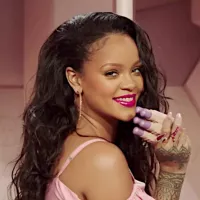
Robyn Rihanna Fenty is a highly successful Barbadian singer actress...
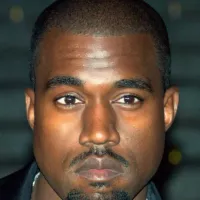
Kanye West professionally known as Ye is a highly influential...

Michael Joseph Jackson the King of Pop was a highly...
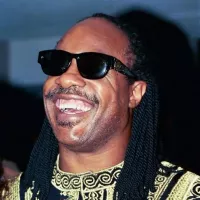
Stevie Wonder born Stevland Hardaway Morris is a highly influential...
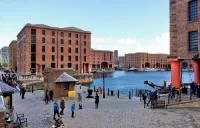
Liverpool is a port city and metropolitan borough located in...
Trending
2 months ago Hall High School in West Hartford went into secure mode; no weapon found.
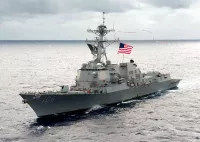
3 months ago Upstart's Q3 Earnings: Mixed Results, Soft Q4 Guidance, and Stock Slides After Announcement.
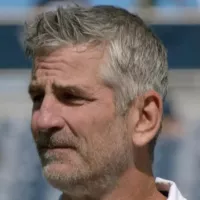
3 months ago Frank Reich Returns to Carolina, Set to Face Bill Belichick Once Again.
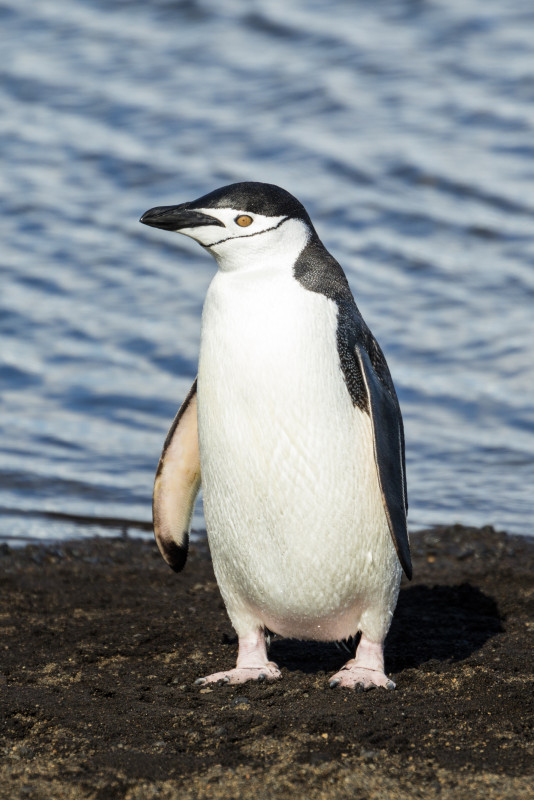
Penguins are flightless semi-aquatic seabirds almost exclusively inhabiting the Southern Hemisphere with the exception of the Gal pagos penguin Adapted...
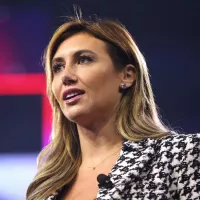
2 months ago Alina Habba Disqualified: Court Rules Against Former Trump Lawyer in New Jersey Role
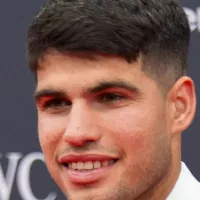
3 months ago Alcaraz vs Fritz Clash at ATP Finals 2025: A Minute-by-Minute Look
Popular

Thomas Douglas Homan is an American law enforcement officer who...

XXXTentacion born Jahseh Dwayne Ricardo Onfroy was a controversial yet...

William Franklin Graham III commonly known as Franklin Graham is...

Jupiter is the fifth and largest planet from the Sun...

Instagram is a photo and video-sharing social networking service owned...

Martin Luther King Jr was a pivotal leader in the...
